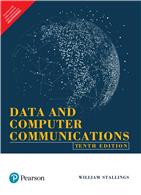Data and Computer Communications

|
Author(s):
Author:
William Stallings
- ISBN:9789332586932
- 10 Digit ISBN:9332586934
-
Price:Rs. 1030.00
- Pages:912
- Imprint:Pearson Education
- Binding:Paperback
- Status:Available
-
|
With a focus on the most current technology and a convenient modular format, this best-selling
text from Pearson offers a clear and comprehensive survey of the entire data and computer
communications field. Emphasizing both the fundamental principles as well as the critical role of
performance in driving protocol and network design, it explores all the critical technical areas in
data communications, wide-area networking, local area networking, and protocol design in detail."
Table of Content
Chapter 1 Data Communications, Data Networks, and the Internet
Chapter 2 Protocol Architecture, TCP/IP, and Internet-Based Applications
Chapter 3 Data Transmission
Chapter 4 Transmission Media
Chapter 5 Signal Encoding Techniques
Chapter 6 Error Detection and Correction
Chapter 7 Data Link Control Protocols
Chapter 8 Multiplexing
Chapter 9 WAN Technology and Protocols
Chapter 10 Cellular Wireless Networks
Chapter 11 Local Area Network Overview
Chapter 12 Ethernet
Chapter 13 Wireless LANs
Chapter 14 The Internet Protocol
Chapter 15 Transport Protocols
Chapter 16 Advanced Data Communications Topics
Chapter 17 Wireless Transmission Techniques
Chapter 18 Wireless Networks
Chapter 19 Routing
Chapter 20 Congestion Control
Chapter 21 Internetwork Operation
Chapter 22 Internetwork Quality of Service
Chapter 23 Multiprotocol Label Switching
Chapter 24 Electronic Mail, DNS, and HTTP
Chapter 25 Internet Multimedia Support
Chapter 26 Computer and Network Security Threats (online)
Chapter 27 Computer and Network Security Techniques (online)
|
Salient Features
1. A modular format—This structure breaks this massive subject into comprehensible parts, thus making learning easier for students.
2. Unifying principles—The text repeatedly emphasizes such principles as multiplexing, flow control, and error control, and contrasts their application in specific areas of technology. This enables students to understand how the same protocol design principles are applied at different levels of the protocol architecture.
3. Standards—A comprehensive discussion of the current status and future direction of related technology standards helps students understand the central role of standards in network and protocol design.
4. More than 250 homework problems—Problems ranging in difficulty give students the opportunity to test their comprehension of concepts.
5. Strong pedagogical support—The liberal use of figures and tables; glossary; recommended reading list and Websites; and a bibliography provide students with convenient study tools."
|
|
|
|
|